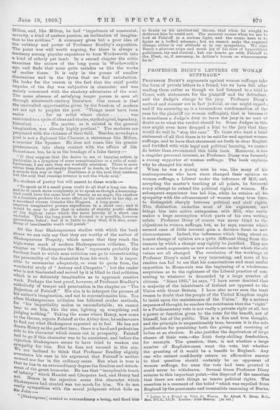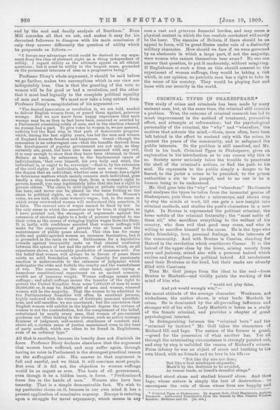PROFESSOR DICEY'S LETTERS ON WOMAN SUFFRAGE.*
PROFESSOR DICEY'S arguments against woman suffrage take the forM of private letters to a friend, but we have felt after reading them rather as though we had listened to a trial in Court, with statements for the plaintiff and the defendant, and the Judge's charge to the jury. Professor Dicey's method and manner are in fact judicial, as one might expect ; and if his summing up is a. tremendous condemnation of the case for the plaintiff (or woman suffragist), that is because it is sometimes a Judge's duty to leave the jury in no sort of doubt as to what the verdict should be. Some Judges in this case might even have dropped a hint to the jury that they would do well to " stop the case." To those who want a brief statement of all that there is to be said for and against woman suffrage, and to have that statement set forth in clear English and fortified with wide legal and political learning, we cannot do better than recommend this little book. Moreover, it has a singular personal interest, as Professor Dicey was formerly a strong supporter of woman suffrage. The book explains why he changed his mind.
When lie was a young man he was, like many of his contemporaries who have since changed their opinion on woman suffrage, a Liberal under the influence of Mill, and, accepting the master's teaching at all points, he favoured every attempt to extend the political rights of women. His subsequent experience has led him, while he retains all his sympathy with the advancement of women along true lines, to distinguish sharply between political and civil rights. This distinction underlies most of his argument, and brings him into active antagonism with Mill, who really makes a huge assumption which parts of his own writing refute. Professor Dicey of course was never blind to th,) objections to woman suffrage, but, as be says, reasons which seemed once of little account gain a decisive force iu new circumstances. Indeed, the influences which bring about an honest change of opinion are a quite different thing from the reasons by which a change may rightly be justified. They are not so much arguments as now conditions under which the old values are all changed. The revelation of the workings of Professor Dicey's mind is very interesting, and none of his readers can fail to see that his conscientious and most useful opposition to Home-rule was the beginning of a wholesome scepticism as to the rightness of the Liberal practice of con- senting to whatever is demanded by a large number of citizens. "Since 1885," he says, "I have never doubted that a majority of the inhabitants of Ireland are opposed to the Union with Great Britain. I have also never seen the least reason to doubt that the people of the United Kingdom ought to insist upon the maintenance of the Union." By a natural sequence of thought, he reaches the conclusion that the "right" to a Parliamentary vote is not really a private right at all, but a power or function given to the voter for the benefit, not of himself, but of the public. This is a fine and true thought, and the principle is unquestionably 'true, because it is the sole justification for punishing both the giving and receiving of bribes at an election. It also justifies the deprivation of large classes of their vote,—the Irish forty-shilling freeholders, for example. The question, then, is not whether a large number of Englishwomen want the vote, but whether the granting of it would be a benefit to England. Any one who cannot confidently return an affirmative answer
to that question should certainly be an opponent of woman suffrage, for once the vote had been granted it could never be withdrawn. Several times Professor Dicey returns to this important point,—the disproof of the assertion that there are such things as innate political rights. The assertion is a remnant of the belief "which was expelled from England by the passionate and irresistible reasoning of Burke,.
* Letters to a Friond on Votos for Woman. By Albert V. Dicoy, Hon. D.C.L., LL.D. London: Jain Murray. Lle. net.]
and by the cool and deadly analysis of Bentham." Even Mill concedes all that we ask, and makes it easy for his devoutest followers to disagree with his main conclusion if only they answer differently the question of utility which he propounds as follows :—
" I forego any advantage which could be derived to my argu- ment from the idea of abstract right as a thing independent of utility. I regard utility as the ultimate appeal on all ethical questions ; but it must be utility in the largest sense, grounded on the permanent interests of man as a progressive being."
Professor Dicey's whole argument, it should be said before we go farther, makes two assumptions which in our view are indisputably true. One is that the granting of the vote to women will be for good or bad a revolution, and the other that it must lead logically to the complete political equality of men and women. We must now take a long extract from Professor Dicey's recapitulation of his argument :-
"The desired innovation or revolution is, we are told, needed to deliver English women from, or guard thorn against, grievous wrongs. But we now know from happy experience that such wrongs may be, as they in fact have been, removed or averted by a Parliament consisting solely of men, and in the election whereof no woman had a part. To give votes to women is, we are assured, nothing but the final step in that path of democratic progress which, during the last eighty years, has led the men and women of England towards freedom and happiness. Grant—though the concession is an extravagant one—that the benefits derived from the development of popular government are not only, as they certainly are, great, but have also been unmixed with any evil, it is easy enough to show that they have been obtained, in Groat Britain at least, by adherence to the fundamental canon of individualism, 'that over himself, his own body and mind, the individual is, or ought to be, sovereign '—that is, by the extension of the civil rights of individuals, whether men or women. But the dogma that an individual, whether man or woman, has a right to determine matters which mainly concern such individual, goes hardly a stop towards showing that, from a woman's right to govern herself, you may legitimately infer that she has a right to govern others. Tho claim to civil rights or private rights never has been, and never can be, placed on the same footing as the claim to political rights, or, in other words, duties. Women's votes, we are told, will raise women's wages; but, in the sense in which every overworked woman will understand this assertion, it is false. The current rate of wages cannot be fixed by law. In the only sense in which the assertion may be true, it supplies, as I have pointed out, the strongest of arguments against the extension of electoral rights to a body of persona tempted to use their votes as the means of wringing higher wages from the State. It is, lastly, with confidence asserted that woman suffrage will make for tho suppression of private vice at home and the maintenance of public peace abroad. This idea has for many noble and public-spirited women an immense fascination, but it is grounded in the main on error. Enthusiasm for a legislative crusade against immorality rests on that eternal confusion between the sphere of law and the sphere of ethics, which, as all experience shows, is invariably productive of immense evil. For the belief that women will always be in favour of peace there exists no solid foundation whatever. Capacity for passionate emotion is unfavourable to tho calmness of judgment which anticipates the risks and forbids the cruelty and the wastefulness of war. The reasons, on the other hand, against trying a hazardous constitutional experiment on an ancient common- wealth are of immense weight. Woman suffrage means adult suffrage ; and adult suffrage moans the transfer of the right to govern the United Kingdom from some 7,000,000 of mon to some 20,000,000 or, it may be, 24,000,000 of men and women, whereof women will bo the majority. That the women to be admitted to the Parliamentary franchise will often be excellent persons, highly endowed with the virtues of fortitude, personal unselfish- ness, and self-sacrifice, we are convinced; but the conviction that English• women will exhibit in the highest degree the virtues of women is not the contradiction, but the complement of the belief, entertained by nearly every man, that women of pre-eminent goodness are often lacking in the virtues, such as active courage, firmness of judgment, self-control, steadiness of conduct, and, above all, a certain sense of justice maintained even in the heat of party conflict, which are often to be found in Englishmen, even of an ordinary type."
All that is excellent, because its brevity does not diminish its force. Professor Dicey declares elsewhere that the argument that women have suffered, and may suffer again, through having no voice in Parliament is the strongest practical reason on the suffragists' side. His answer to that argument is full and careful, and we think it will convince most people. But even if it did not, the objection to woman suffrage would be as cogent as ever. The basis of all government, even though it be a hidden basis, is force. " Predominant force lies in the hands of men." Women also have less tenacity. That is a simple demonstrable fact, We wish to lay particular stress on it, because in our own mind it has a present application of conclusive urgency. Europe is entering upon a struggle for naval supremacy, which means in any case a vast and grievous financial burden, and may mean a physical contest in which the less resolute combatant will surely be the loser. The enemies of Britain, if there should be an appeal to force, will be great States under rule of a distinctly military character. How should we fare if we were governed by an electorate in which a large part, if not the majority,. were women who cannot themselves bear arms P No one can answer that question, to put it moderately, without misgiving. If Englishmen at such a time as this should consent to the experiment of woman suffrage, they would be taking a risk which, in our opinion, no patriotic man has a right to take in the name of his country. They would be playing fast and loose with our security in the world.











































 Previous page
Previous page